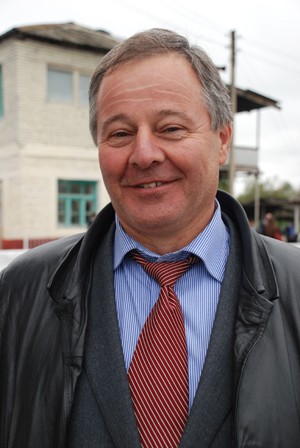
Hamid Mikayilov owns Girkhbulag Trout Farm, located just outside the city of Sheki, in rural Azerbaijan. Over 40 percent of the country's population makes its livelihood from agribusiness, yet agriculture comprises only 6 percent of its GDP.
Using a USAID-sponsored grant, as well as his own resources, Mikayilov and his son, Anar, who operates the farm, rehabilitated an outdated feed mill located on the property.
"I wasn't planning on rehabilitating the feed mill now, until I heard that I could get help from USAID. That opportunity made me speed up my long-term plans and do it right away," said Mikayilov, who has reinvested his profits into his farm and is looking forward to continuing to grow the business.
Aquaculture is a growing and dynamic sector in Azerbaijan, with about 300 fish farmers active in the northwestern region of the country. With abundant sources of fresh water in the mountainous areas and a history of fish farming, Azerbaijan's aquaculture sector has the potential to provide sustainable income to rural populations. However, significant obstacles still prevent the sector from achieving its potential.
One of the most pressing challenges is the lack of appropriate fish feed for sale in the local market. Fish farmers face a choice between paying a high price for feed imported in small batches from neighboring countries and making their own feed out of whatever ingredients they can find. The results are often very disappointing as this homemade feed does not meet the nutritional standards fish need to grow. Due to the lack of locally available high quality feed, fish stocks have remained stunted and malnourished, which directly affect local farmers' potential incomes.
Opened last fall, the new mill has the capacity to produce 30 tons of fish feed annually, which will include a mixture of feeds for various fish species and sizes.
Mikayilov has said he plans to sell his feed to about 50 farmers located around Sheki. "This work is very rewarding, both commercially and morally. I credit USAID with giving me the confidence to get started, and now I've been swept away!" This new mill will provide a key missing ingredient for sustainable growth of aquaculture in rural Azerbaijan.







Comment
Make a general inquiry or suggest an improvement.